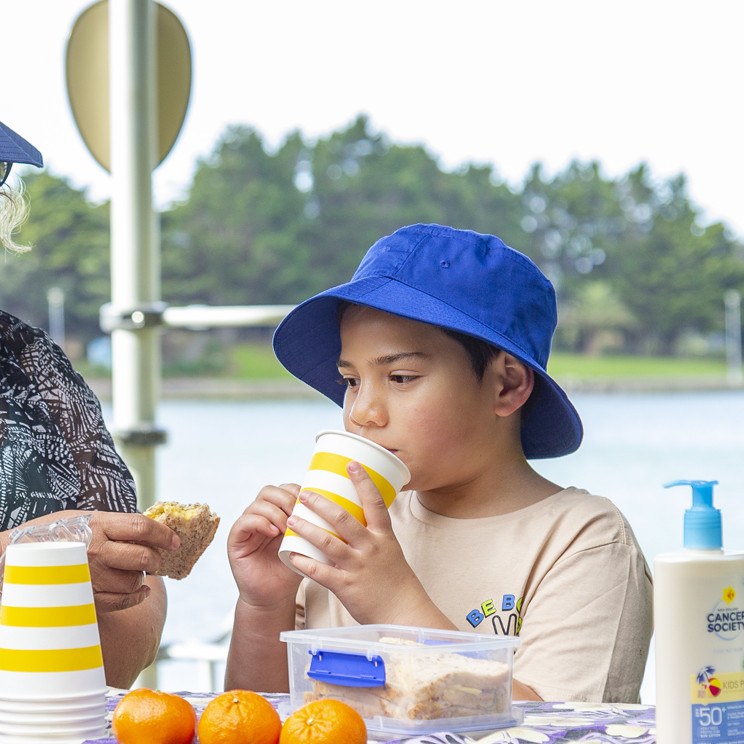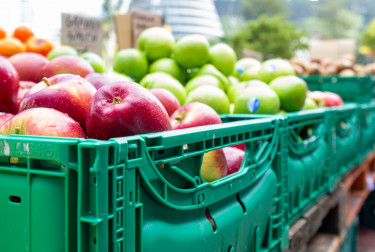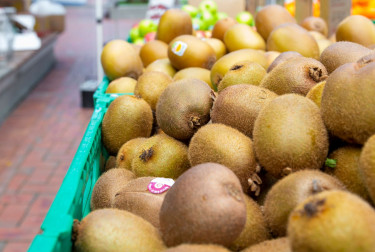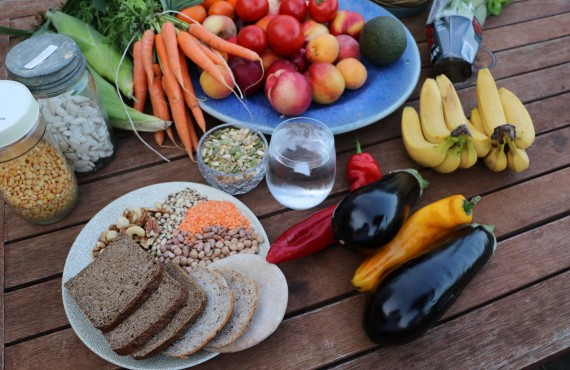Eating well is important for keeping well, especially when you have cancer.
What is healthy eating with cancer?
Cancer and its treatment place extra demands on you. Extra energy (calories), protein and nutrients are often needed.
Eating well during and after cancer treatment will help you have more energy, cope with side effects, and recover quickly.
Try to enjoy a variety of healthy foods every day, including:
- plenty of vegetables and fruit
- whole-grain foods that are naturally high in fibre, such as bread, crackers, breakfast cereal, rice, and pasta
- some milk and milk products (cheese and yoghurt) or alternatives that are mostly low or reduced-fat
- some lentils, legumes, nuts and seeds or fish, chicken and/or red meat (less than 350 - 500g cooked or 700-750 grams raw and no more than three portions per week) with the fat removed.
If you were following a special diet before your diagnosis or having problems with eating, talk with your cancer treatment team to ensure your nutritional needs are being met.



Choose and/or prepare foods and drinks:
- with unsaturated fats such as canola, corn, rice bran, soy or olive oil, avocado and margarine instead of saturated fats like butter, coconut, palm oil or cheese
- that are low in salt (sodium). Choose reduced or non-added salt foods such as peanut butter or margarine. If you use salt, choose iodised salt
- has little or no added sugar and is not processed, such as fresh fruit rather than juice, whole potatoes rather than crisps, porridge rather than rice bubbles.
He mea nui kia pai te kai me te whai taumahatanga tōtika mō tō hauora me tō toiora.
He mea tino nui hoki tēnei mehemea kua whai matepukupuku koe.
Mā te kai tōtika e āwhina kia tū pakari ai koe i te wā o tō maimoatanga, i te wā whai muri anō hoki. Tērā pea, ka rerekē te āhua o tō kai, me ngā kai ka kainga e koe.
Ka kōrero tēnei puka mō ētahi o ngā rerekētanga tērā pea ka rongo koe, me ngā raruraru tērā pea ka puta. Ka hoatu whakaaro hoki mō te whakahaere i ēnei, me tana whakautu i ētahi pātai auau e pā ana
ki te kai me te matepukupuku.
Oral health
If your cancer treatment could impact on your mouth, it is a good idea to go to your dentist for a check up before starting cancer treatment. They will make sure that there are no infections in your mouth that may complicate cancer treatment.
Take extra care of your teeth and reduce the risks of infection and dental problems by:
- Use a soft toothbrush to clean your teeth, tongue and gums each day.
- Avoid alcohol, smoking and over-the-counter mouthwashes which can dry and irritate your mouth
- Make sure dentures are cleaned and sterilised regularly to avoid infection
- Regularly use a gentle mouthwash, such as one made using the recipe below
- Avoid sugary snacks, soft drinks and acidic fruit juices
Mouthwash recipe
Add 1 tsp salt and 1 tsp of bicarbonate of soda (baking soda) to 1 litre of water. Mix until dissolved.
Store in the fridge. Discard after 24 hours.
Use as a mouthwash, rinsing the mouth as required. Spit out and avoid swallowing. Use it often during the day, after food and before going to sleep at night. This mix is a good cleanser. It helps healing, helps to break down thick saliva and reduces tooth decay.
Coping with eating problems
Treatment affects people in different ways but most eating problems can be managed. They usually go away soon after treatment has finished.
Here are some common problems with eating during cancer treatment and so tips to help you with these problems:
You may feel extremely tired (fatigued) during and after treatment. This can affect your eating.
Here are some tips to help you:
- Eat small, regular meals and snacks throughout the day
- Stock up on ready to eat foods such as tinned or frozen meals and snacks such as soup, yoghurt, muesli bars, dried fruit, nuts, crackers, cheese, tinned fish, hummus and dips
- Look for food that is easy to prepare, and local meal-delivery options.
- Plan ahead. If you have a freezer, prepare food when you are feeling more energetic and freeze these for use when you are feeling tired
- Shop online for groceries if you do not have the energy to go to the supermarket
- Take up offers of support from family/whānau, friends or neighbours to help with cooking meals or buying groceries. The Cancer Society has a online tool to help you co-ordinate offers of help. Find out more about Support Crew
- Avoid missing meals. Try a nutritious drink such as a smoothie or milkshake
Changes in appetite can be normal due to the effects of your cancer, treatment, fatigue, pain, anxiety, or depression.
Even though you may not feel hungry, your body still needs food to maintain your weight and support your recovery. Think of food as part of your treatment plan.
The following ideas may help:|
- eat small, regular meals and snacks throughout the day
- eat at regular times
- make the most of your appetite when it is good and you are most hungry
- if you cannot face food try drinking smoothies, flavoured milk or supplement drinks
- use easy-to-eat, soft, moist food such as soup, eggs, casseroles, mashed vegetables and gravy, stewed fruit and yoghurt, and milk puddings
- eat calorie-rich foods like avocado, cream, butter, margarine or spreads, oil, or salad dressings and protein-rich foods like meat, fish, chicken, eggs, nuts, nut butter, hard cheese, or milk
- make your food look appealing by serving smaller portions and using garnishes like herbs, tomato, lemon or orange slices
- keep ready-to-eat meals and snacks handy for times when you do not feel like preparing food. Pre-prepared soups, frozen meals, tinned fruit, yoghurt, cheese, dips and crackers are good examples
- enjoy your eating by sharing it with friends and family/whānau when possible.
Try to relax before meals or take a short walk to increase your appetite.
Nausea is a common side effect of cancer treatment.
The following ideas may help you:
- take anti-nausea medication as prescribed
- eat small, regular meals and snacks throughout the day
- try to avoid getting hungry as this can lead to nausea
- eat dry bland foods like toast and crackers
- aim to drink plenty of fluids, 1.5 litres is a good daily target. This will help reduce nausea.
- Sip fluids throughout the day, such as ginger ale, lemonade, clear broth, supplement drinks, and ice blocks, or dilute fruit and vegetable juices
- limit smells by eating food that is cold or at room temperature food rather than hot food
- avoid cooking and kitchen smells by asking for help with meal preparation or use convenience meal options
- try drinks and foods containing ginger, such as flat ginger beer, ginger tea, and ginger biscuits
- avoid fatty and spicy foods, which can increase nausea
- take your time over meals
- distract yourself with music, a favourite TV programme, or company
- take a short walk in the fresh air before eating or try some slow, deep breathing.
Vomiting sometimes follows nausea and may be caused by treatment, stress, food odours or gas in the stomach or bowel. If you cannot keep fluids down or vomiting lasts for more than 24 hours, contact your treatment team.
Some changes to your eating can help:
- take anti-nausea medication as prescribed
- sip small amounts of fluids as often as possible. Try dry ginger ale, cold flat lemonade, soda water, Lucozade or chilled tomato juice
- sucking on a hard lolly, crushed ice cubes or an ice block can be soothing
- start drinking and eating slowly once vomiting has stopped. Try foods like dry biscuits, pretzels, toast or bread, jelly, cooked cereals (lemon sago, porridge or boiled rice)and soft stewed fruits (apples, pears, and peaches)
- introduce small amounts of milk gradually, or try yoghurt
- gradually increase your food intake until eating returns to normal
- your GP or treatment team may advise you to take a nutritional supplement
Changes to taste, texture and smell
Cancer and its treatment can change the way your salivary glands work and affect your sense of taste, texture and smell.
Some foods may have less taste than before and others may have a salty, bitter or metallic taste. Your mouth may be more sensitive to food and drinks that are cold, hot, spicy, or fizzy. These changes can affect your enjoyment of food.
These ideas may help to improve the taste of your food:
- if you find food tastes bland, experiment with different foods and flavours such as fresh herbs, ginger, garlic, soy sauce, gravies, spices, and relishes
- if you have lost your taste for meat, try marinating it in soy sauce, honey, ginger, or fruit juice before cooking
- try alternatives to meat such as lentils, legumes, nuts, eggs, and cheese
- if food is too salty, avoid adding salt when cooking
- if food tastes too sweet, try foods with less sugar such as porridge, and Weetbix
- try refreshing, moist foods such as melons and berries
- if you experience a metallic taste try using plastic or non-metal utensils.
Here are some ways to help reduce off-putting food smells:
- choose plain foods with low smell levels
- ask for help with meal preparation, or try pre-prepared or easy meal options
- use an extractor fan, cover pots when cooking, open doors and windows, or cook outdoors such as on a BBQ
- serve food at room temperature rather than when the food is hot or very cold
Some treatments, such as chemotherapy and radiation to the head and neck, can affect the salivary glands causing a lack of saliva, or sometimes a thick saliva or mucous, making eating difficult.
A dry mouth can occur due to dehydration or due to some medication. A dry mouth and lack of
saliva significantly increases the risk of infections in your mouth and throat.
You can:
- moisten food with gravy, sauces, custard, cream, milk, butter, margarine, oil or dressings
- use tender moist foods such as soups, casseroles, and minced or pureed meals
- sip fluids throughout the day such as water, weak or fruit tea, milk, or supplements (if needed)
- suck ice chips and chew sugar free chewing gum
- dip biscuits in hot drinks to soften them
- avoid coffee, alcohol, smoking, and dry, salty, spicy, and very hot or cold foods
- use artificial saliva, gels or an oil mouth spray (do not use before your radiation treatment)
- apply lip balm to prevent lips drying or cracking
If you have long-term issues with dry mouth after cancer treatment, you will need to talk with your treatment team for more specific advice
Mouth sores, ulcers (mucositis), infections, and swallowing difficulties (dysphagia) can occur due to treatment for your cancer.
Poor teeth and ill-fitting dentures can also cause pain, making chewing and swallowing difficulties worse.
If you need to adjust the texture of your food try soft, moist, pureed or minced food. If you are having ongoing mouth or swallowing issues, or you are losing weight, you may need a referral to a dietitian or speech language therapist.
Pain and discomfort on swallowing
Tenderness in the mouth and throat can make it difficult to eat. You may want to:
- use pain relief as prescribed
- eat soft, moist, minced and puréed foods, which are easy to eat
- eat small, regular meals and snacks throughout the day
- use a gentle mouthwash regularly
- keep your mouth moist by sipping fluids during the day
- drink through a straw to help avoid sore areas in your mouth
- try drinks such as milk, milkshakes and supplement drinks to get extra calories and protein.
avoid alcohol and smoking - avoid spicy, very hot or cold, salty, and acidic food such as kiwifruit, citrus fruit and tomatoes.
Bowel problems
Cancer and its treatment can irritate your bowel causing increased wind (flatulence), constipation and diarrhoea.
If too much wind is a problem it may help to:
- avoid drinking through a straw
- avoid chewing gum
- limit fizzy drinks, or let them go flat first
- limit ‘gassy’ vegetables such as cabbage, onions, cucumber, peas, lentils, and beans.
Poor appetite, being less active than usual, and side effects of treatment can cause constipation (difficulty pooing).
To help your bowel working properly, you can:
- eat regular meals
- make sure you are eating foods high in fibre - high fibre breakfast cereals (porridge, Weet-Bix, All-Bran); wholewheat pasta; brown rice; wholegrain bread and oats, barley and rye; fruit (berries, pears, melon and oranges); vegetables (broccoli, carrots and sweetcorn0; peas, beans and pulses; nuts and seeds; and, potatoes with skin on.
- eat natural laxatives - kiwifruit, prunes or their juices
- drink plenty of fluid (8-10 glasses or 1.5-2.0 litres per day)
- keep active - exercise every day. Walk, bike or do yoga.
Check with your treatment team about using a laxative, stool softener, and/or fibre supplement if constipation continues to be a problem.
Infections, some medications, and cancer treatments can harm or irritate your bowel causing diarrhoea and loose watery bowel motions(poo).
Watch for signs of dehydration such as increased thirst, dry mouth, feeling tired, having a headache, and weeing less.
You can:
- take anti-diarrhoea medication if it is prescribed by your treatment team
- drink more to replace lost fluids, at least 8-10 glasses (1.5 to 2 litres) of clear fluid daily such as water, vegetable juice, clear soup, weak tea, or fruit juice. Do not have undiluted sports drinks, as these can
make diarrhoea worse - try to have small frequent meals and snacks, and eat slowly
- include a small serving of protein in each meal such as meat, fish, chicken, eggs, tofu, milk, cheese, and yoghurt.
- choose foods that are low in fibre such as white rice, pasta, bread, cereals, bananas, mashed potato, boiled green banana, and taro.
- avoid foods that may upset your bowel such as wholegrain breads and cereals, dried fruit, nuts and seeds, raw fruit, unpeeled vegetables, spicy, fatty or oily foods, coffee and alcohol
- try soy or lactose-free milk if you experience a temporary intolerance to milk or dairy products.
If diarrhoea continues, talk to your treatment team.
After bowel surgery and treatment you may need to eat a low-fibre diet for four to six weeks.
You should only follow this way of eating if instructed by your doctor or dietitian.
Low fibre foods to try eating:
- White breads and cereals - rice bubbles, porridge, cornflakes, plain crackers, muffins, biscuits and cakes
- Fruit and vegetables (small servings, soft, well cooked and tender) - banana, melon, tinned pears, well cooked carrots, kumara, potatoes, pumpkin, asparagus, courgettes, spinach, avocados, boiled taro and green banana. Clear and smooth vegetable soup
- Milk and milk products - plain yoghurt or fruit yoghurt without seeds, cheese, cottage chees, sour cream, cream cheese, ice cream
- Beans, pulses, fish (tuna, salmon, poached or baked fish and fish cakes), seafood, eggs, chicken, meat (soft and tender) and small amounts of tofu
- small amounts of fats and oils
- cow or soy milk, water, tea, Milo, Complan, strained juices but not prune juice, clear or strained soup
- honey, salt, jam without pips, marmite/vegemite, butter, jellies, smooth peanut and other nut butters
Foods to consider avoiding include:
- seeds, dried fruit and nuts
- most raw fruit and vegetables
- grainy breads and cereals
- tough stringy food such as celery, coconut and gristle from meat fatty foods such as takeaways and fast foods.
For more information:
Being safe with food
Cancer and some treatments (such as chemotherapy and stem cell transplants) can weaken the body’s immune system by affecting white blood cells that protect your body against infection.
Take care when preparing food, because your lowered immunity can increase the risk of your getting sick from the food you eat:
- prepare and store food to minimise the growth of germs
- wash hands thoroughly before meal preparation and eating
- wash, dry or cook fruit, salad and vegetables
- handle raw meat, fish, poultry, and eggs with care, and clean thoroughly any utensils and surfaces that have been in contact with these foods
- keep raw meats separate from cooked food
- use pasteurised milk, cheese and juices
- cover leftovers and put them in the fridge within two hours. Eat within 24 hours, reheat until steaming hot, and only reheat leftovers once
- use ingredients that are as fresh as possible and use before their use-by date
- Avoid raw and smoked seafood, deli salads and meats, premade sandwiches, sushi, egg dishes and any raw or undercooked meat, fish, shellfish or chicken
- take care if you are eating away from home. If possible ask for your meals to be made fresh and avoid foods that have been sitting for unknown periods of time.
For more information:
Food safety when you have low immunity
Many people told us not to eat favourite foods while on chemo. They did and never wanted to eat them again!
Debbie
Tips for carers
If you are caring for someone with cancer it can be challenging to know how best to support them with any eating problems they may be experiencing.
Despite your best efforts, the food you prepare may not always be eaten. Try not to be discouraged – people having cancer treatment do not always have to follow strict eating.
You could:
- gently encourage them to eat little and often when they are feeling well
- serve smaller meals as this can make the meal more appealing
- keep ready-to-eat food and drinks handy, such as tinned fruit, yoghurt, milk, crackers and cheese, or frozen meals
- prepare meals that are easy to eat, such as soft, moist, pureed food, if needed keep mealtimes flexible
- try new recipes
- make meals as enjoyable as possible – eat together, play music, set the table with candles and flowers
- buy food in small quantities, as taste and appetite can change often
follow safe food handling practices when preparing food.
We know that going through cancer is tough and can raise many questions. You are not alone.
We have health professionals to answer your questions and provide the support you need.
Get in touch


